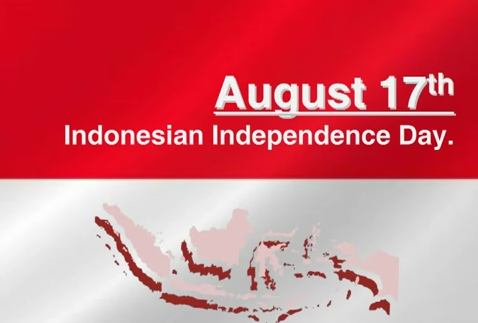
Praise the Lord, for the rains have finally arrived.
And so we find ourselves moving and gathering momentum towards the festive period. Indeed, no less an authority than the Pope himself has just chimed in on the subject of this year’s yuletide, the official papal verdict being that it’s going to be a, “charade,” given recent world events. Certainly sounds like a few Christmases I’ve spent before. Well thanks for that, Francis my old mate. Why don’t you just stick to your job, eh? Just wish everybody a Happy Christmas, instead of bequeathing us an atmosphere as noxious as that left by a fat uncle who has polished off too many Brussels sprouts at Christmas lunch.
Thankfully though, here in Indonesia things are looking up somewhat as the daily likelihood of precipitation is finally above diddly-squat. Yes, the rains have arrived, and not a moment too soon, as the El Niño effect, coupled with unbridled avarice and stupidity, have conspired to ensure that a cloud of choking smoke the size of the former Soviet Union has been released over Southeast Asia.
Apparently however, according to the current (and alas also a previous) vice president, only half the country being on fire doesn’t actually constitute a national disaster. The half that was on fire not being the half that he lives in may also have been a factor here. Although you would be a fool and a communist to point out that if imperial Java had been blanketed in smoke, then we may have seen rather less foot dragging on the issue.
Thankfully, the apocalyptic flames are now finally being quenched and the country can reflect on a truly appalling year, even by its own dismally low standards. Indeed, Indonesia’s fires have pushed atmospheric carbon to levels not seen on this planet for over 2 million years (400 ppm to be precise) and ended up releasing some 1 billion tonnes of the stuff over poor old Borneo and Sumatra. Some even claim that this may have actually pushed the entire planet over a runaway global-warming tipping point. In this context, I’m not sure that even January’s inevitable torrents will be able to wash away a sin so apocalyptically awful.
And so Indonesia’s farmers try to pick up the pieces and tend to their cracked, blistered plots as the rain ramps up through the gears and the drought subsides. Here in the terminal urban terminus of the Indonesian capital, it’s been a bit of a novelty to use one’s umbrella again after nine long, hot months.
City dwellers generally have a somewhat ambivalent relationship with rain, and I’m sure that by the middle of January, the deluges will really start to grate once more. We’ll soon be arriving at work looking like drowned baboons, while the country’s notoriously porous ceilings spring leaks and turn to sodden cardboard, and clothes start smelling like an ojekdriver’s socks because it’s taken three days for them to dry.
And that’s without mentioning far more serious issues such as landslides and biblical flooding. God knows how the city’s putative, currently-under-construction subway stations will cope with all of this. It’ll be like SeaWorld down there.
One image from a previous year’s flooding is forever seared into my brain and involved the rather ludicrous tableau of a housemate and myself in our underpants at 3am frantically bailing rainwater out of our living room with empty Pizza Hut spaghetti trays. Indeed, previous wet seasons have seen my landlubber shipmates and our dodgy leaking ceilings recreating those scenes from World War II movies in which the German U-boat dives too deeply in order to escape the Allied depth charges and the rivets start popping out followed by jets of seawater and general Nazi sturm und drang.
In Jakarta, the rains can turn houses into sewage processing plants, half-hour journeys into Homerian odysseys and trips to the local market into mud-spattered trench warfare. Seasonal affective disorder may well be upon us folks, and that’s sad.
Hopefully though, having just gone through an El Niño/man-made environmental catastrophe, Indonesia will be spared serious flooding this year. Jakarta’s preparedness for such an eventuality, while still sketchy, has hopefully been booted a few rungs up the mission-critical ladder from previous efforts. A few years back, I recall the city administration proudly boasting of having purchased a whopping 10 rubber dinghies.
Thankfully, 26,000 infiltration wells are currently being dug across the capital for run-off water to drain into. Indeed it’s a false economy not to invest in these kinds of measures, as during the previous rainy season, Rp.3 trillion in losses were inflicted in a single week in Jakarta. Such losses, however, be they the result of forest fires or flooding, are to be born by the public, while investment designed to mitigate such disasters would have to come out of government budgets earmarked for palm grease and pied-à-terres.
Tsunamis, landslides, fires, haze, droughts, floods: has mother nature, so generous in blessing this country with so much bountiful fertility, now turned her back on her Indonesian progeny as a punishment for its rapaciously corrupt excesses and poor stewardship of its Edenic inheritance? Will we be able to pull together as a species and tackle these issues head-on? Or will the new Star Wars flick win out in the ongoing battle for hearts and minds?
As the writer Chris Isherwood once said, the rich world has “retired to live inside [its] own advertisements. Like hermits going into caves to contemplate.” And there’s a sense in which environmental concerns are now the preserve of Facebook feeds that we lap up before signing an online petition with brows suitably furrowed and chowing down on another bowl of palm oil-laced noodles. Clicktavism they call it.
So, will we be able to save Jakarta from being regularly waterboarded by the Almighty? Storming the ramparts of parliament in KPK-logoed combat fatigues and kicking the whole rotten bunch out on their exquisitely tailored arses would be a good start perhaps.
Maybe the future will look something like the one predicted by the late, legendary Kurt Vonnegut in the pages of his Darwinian prophecy of a novel Galapagos. In the book, the process of evolution by natural selection rounds decisively upon our capacious human brains. Brains which have brought so much suffering and environmental calamity to the world are depicted as having little intrinsic survival value, and are thus portrayed as an evolutionary dead-end in the book. In Vonnegut’s vision, homo-sapien grey matter thus starts to shrink and bodies begin to grow seal-like flippers as we return to the blissful ignorance of life’s oceanic cradle.
A little far-fetched? Perhaps, although just maybe the seemingly diminishing cerebral capacities of many power wielders are an early embodiment of the truth of Vonnegut’s thesis. Maybe their descendants will already be equipped with flippers during the Jakarta floods of the future. And there we were thinking that regional devolution referred to politics. Now pass me a bucket of fish please.


















